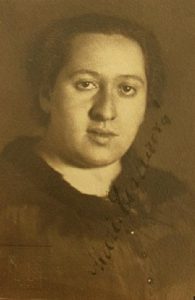By Jerry Klinger


BOYNTON BEACH, Florida — A review committee in London will consider a proposed historical plaque honoring a virtually forgotten Holocaust rescuer, Marie Schmolka, who was instrumental in organizing the Kindertransport.
The plaque would be added to the Golder’s Green Holocaust Rescuer Memorial Wall in front of the Jewish Hoops Lane Cemetery in N.W. London. The plaque would be the first permanent memorial honoring Schmolka.
Marie Schmolka was a leader in the Czech Jewish community in 1933. She was an ardent Zionist and humanitarian as the darkness of Nazim grew with the ascendency of Adolph Hitler to absolute rule of Germany.
Non-Jewish political refugees, but especially Jews, with increasing desperation, sought to flee. They understood to remain in German control was death. Escape was life.
By 1938, over a hundred thousand refugees had poured into tiny Czechoslovakia. Most were nearly destitute, no shelter, jobs, housing, food, or support services. Many became trapped between the no-man’s land of Germany and East European borders that did not want them. It was a humanitarian crisis beyond extremis.
Schmolka could not and would not sit idly by. Her experience with the Women’s International Zionist Organization led to her becoming the president of the National Coordinating Committee for Refugees in Czechoslovakia. She began organizing relief efforts for every need, especially relocation efforts to other countries that would take in the refugees. Few would.
Schmolka eventually became the key coordinator, not just in Czechoslovakia, but in and between many Eastern European countries for refugee rescue.
The crisis of Jewish refugees led the League of Nations to initiate the notorious Evian Conference of July 1938. The Conference’s focus was what to do about the Jews. Schmolka was the only Czech representative to the Conference. Other than the Dominican Republic, no country wanted Jews.
The life-or-death desperation of the refugees drove Schmolka to work even harder despite her own growing health issues. She was consumed by saving lives that no one else wanted to.
Schmolka, working with a refugee social worker, Doreen Warriner, came up with an idea. She learned Britain would be willing to accept numbers of children if they were sent for temporary shelter to the United Kingdom. They would be welcome only if they were sent alone, without their parents.
Schmolka and Warringer began reaching out for help. A well-to-do young British stockbroker was vacationing in France when a friend told him of the humanitarian crisis in Czechoslovakia. He was asked if he wanted to help. Young Nicholas Winton agreed. Schmolka, whom Winton never met and never knew was involved, approved Warriner’s bringing him in.
For three weeks in Prague, Winton labored, utilizing his contacts in British society to help organize what became known as the famed Kindertransport. Winton returned to London and continued working, organizing, and bringing to England 669 children, saving their lives. Winton was knighted (2003)by the Queen of England for his work.
Schmolka remained in Prague. She continued struggling to save lives, even after Czechoslovakia was completely annexed by Nazi Germany in 1939.
Schmolka was arrested and brutally interrogated by the Gestapo and imprisoned for two months. Adolph Eichmann specifically exiled her to France on condition she remove as many Jews as possible from the new German lands.
France fell to Germany in 1940. Schmolka’s health was broken. She escaped to London, where she suffered a fatal heart attack. Her remains were cremated in the Golder’s Green crematorium. Her ashes were lost. No stone, no memorial, for her was ever placed. The woman who had saved thousands seemed lost from memory forever.
Thanks to a new association between the Marie Schmolka Society founded by Dr. Anna Hajkova, Warwick University, Martin Smok, USC Shoah Foundation, and the Jewish American Society for Historic Preservation (JASHP), plans are going forward to honor Schmolka.
Late 2020, JASHP reached out to the Schmolka Society about helping them create memory for Marie when none existed. The Schmolka Society would provide the on the ground support, JASHP, with its extensive historical project experience and funding, agreed to a shiddach.
JASHP proposed as a first step, the marker at Hoops Lane. After the simple marker, JASHP would support funding an honored London Blue Plaque where Marie last lived in London. In Prague, with Martin Smok, JASHP has agreed to fund a permanent historical marker at her birthplace.
JASHP has begun procedures to honor Marie Schmolka by B’nai B’rith in conjunction with the Jerusalem-based Committee to Recognize the Heroism of Jewish Rescuers During the Holocaust at the Scroll of Fire Memorial in the Jerusalem Forest.
On March 17, sources tell me, approval by the Hoops Lane Committee of the plaque for Marie Schmolka, is expected.
*
Jerry Klinger is the founding president of the Jewish American Society for Historic Preservation (JASHP).
Pingback: Drive to Honor Holocaust Rescuer Marie Schmolka | B'nai B'rith Budapest Páholy
very positive article and it should be published in other news papers too!
What a truly amazing woman to have selflessly helped so many of her fellow suffering and frightened Jews. I’ve read about many unsung heroes and she certainly deserves recognition for her actions. Sad she didn’t live a long life after all her amazing work.
What can I say – it is a Mitzvah you are going